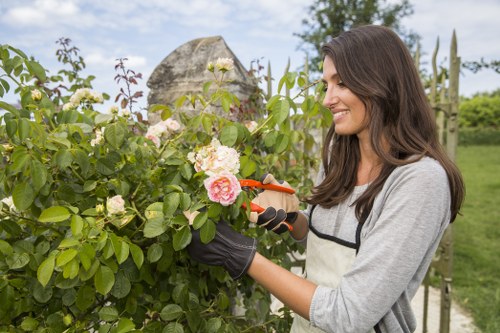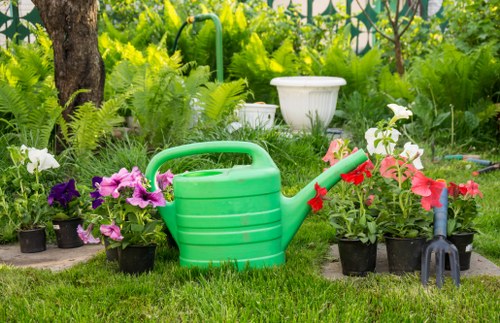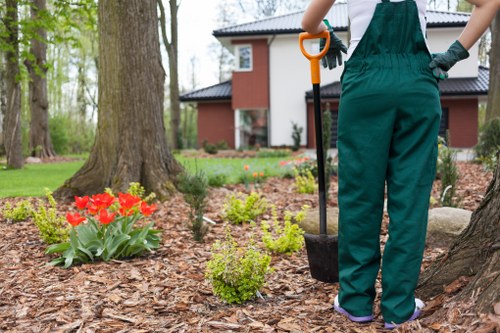Comprehensive Guide to Garden Maintenance in Uxbridge
Introduction to Garden Maintenance

Maintaining a beautiful garden in Uxbridge requires dedication, knowledge, and the right tools. Whether you're a seasoned gardener or a beginner, understanding the essentials of garden maintenance can transform your outdoor space into a vibrant and thriving oasis.
Uxbridge's unique climate and soil conditions mean that specific care must be taken to ensure plants thrive. From choosing the right plants to regular upkeep, effective garden maintenance is key to achieving a stunning landscape.
In this guide, we'll explore the best practices for garden maintenance in Uxbridge, providing you with the tips and tricks needed to keep your garden lush and healthy throughout the year.
Planning Your Garden

Effective garden maintenance starts with proper planning. Understanding the layout, plant selection, and seasonal needs will set the foundation for a sustainable and attractive garden.
Key Considerations:
- Sunlight: Assess the amount of sunlight different areas of your garden receive to choose appropriate plants.
- Soil Quality: Test your soil to determine its pH and nutrient levels, ensuring it's suitable for your chosen plants.
- Water Access: Plan for efficient irrigation systems to maintain consistent moisture levels.
- Plant Selection: Choose plants that are well-suited to Uxbridge's climate and soil conditions.
By carefully planning these elements, you can create a garden that's both beautiful and easy to maintain.
Seasonal Maintenance Tips

Gardens require different maintenance tasks throughout the year. Understanding seasonal needs ensures that your garden remains healthy and vibrant no matter the weather.
Spring:
- Prune dormant trees and shrubs to encourage new growth.
- Apply fertilizers to provide essential nutrients.
- Start planting annuals and perennials to add color.
Summer:
- Regularly water plants, especially during dry spells.
- Weed frequently to prevent competition for resources.
- Monitor for pests and diseases, taking action as needed.
Essential Tools for Garden Maintenance

Having the right tools is crucial for efficient garden maintenance. Investing in quality equipment can make tasks easier and more effective.
Must-Have Tools:
- Pruning Shears: Ideal for trimming and shaping plants.
- Garden Fork: Useful for aerating soil and turning compost.
- Rake: Essential for clearing leaves and debris.
- Hose and Sprinklers: Ensure consistent watering of your garden.
- Wheelbarrow: Helps in transporting materials around the garden.
Maintaining these tools properly will extend their lifespan and ensure they perform optimally.
Pest and Disease Management

Protecting your garden from pests and diseases is a critical aspect of maintenance. Early detection and appropriate treatment can prevent serious damage.
Integrated Pest Management (IPM):
- Inspection: Regularly check plants for signs of pests or disease.
- Identification: Correctly identify the problem to choose the right treatment.
- Control: Use biological controls, such as beneficial insects, or chemical treatments if necessary.
- Prevention: Maintain plant health through proper watering and feeding to resist pests and diseases.
Adopting an IPM approach ensures a balanced and eco-friendly method of managing garden health.
Soil Health and Fertilization
Maintaining healthy soil is the foundation of a thriving garden. The quality of your soil affects plant growth, resilience, and overall garden productivity.
Soil Testing: Regularly test your soil to determine its pH and nutrient content. This information guides effective fertilization and soil amendment strategies.
Organic Matter: Incorporate compost and other organic materials to enhance soil structure, improve drainage, and increase nutrient availability.
Irrigation Practices
Proper irrigation is essential for plant health, especially during Uxbridge's hot summers.
Efficient Watering Techniques:
- Drip Irrigation: Delivers water directly to the plant roots, reducing waste and preventing disease.
- Mulching: Helps retain soil moisture and regulate temperature.
- Timing: Water early in the morning or late in the evening to minimize evaporation.
Implementing these practices ensures that your garden receives the right amount of water without overuse.
Pruning and Trimming
Regular pruning and trimming are vital for maintaining plant health and aesthetics. Properly pruned plants are more vigorous and better shaped.
Benefits of Pruning:
- Encourages healthy growth by removing dead or diseased branches.
- Improves air circulation, reducing the risk of pests and diseases.
- Shapes plants for a more attractive appearance.
- Enhances fruit and flower production by directing energy to productive areas.
Use sharp, clean tools and prune at the appropriate times for each plant species.
Weed Control
Weeds compete with your garden plants for nutrients, water, and light. Effective weed control is necessary to maintain a healthy garden.
Strategies for Weed Management:
- Manual Removal: Regularly hand-pull weeds to prevent them from seeding.
- Mulching: Apply a layer of mulch to suppress weed growth.
- Herbicidal Treatments: Use eco-friendly herbicides as a last resort.
- Preventive Measures: Maintain a clean garden bed to reduce weed establishment.
Consistent weed management keeps your garden plants thriving and reduces maintenance effort over time.
Garden Design and Layout
A well-designed garden layout enhances both functionality and beauty.
Key Design Elements:
- Pathways: Create clear paths for easy access and movement within the garden.
- Focal Points: Incorporate elements like fountains, statues, or specific plant arrangements to draw attention.
- Plant Variety: Use a mix of plant types, colors, and heights to add depth and interest.
- Seating Areas: Provide spaces for relaxation and enjoyment of the garden.
A thoughtful design makes garden maintenance more manageable and the space more enjoyable.
Sustainable Gardening Practices
Adopting sustainable practices ensures your garden remains healthy while minimizing environmental impact.
Eco-Friendly Techniques:
- Composting: Recycle organic waste to create nutrient-rich compost for soil improvement.
- Rainwater Harvesting: Collect and store rainwater for irrigation, reducing water usage.
- Native Plants: Choose native species that are well-adapted to the local climate and require less maintenance.
- Organic Fertilizers: Use natural fertilizers to avoid harmful chemical runoff.
Sustainable gardening not only benefits the environment but also creates a resilient and enduring garden.
Dealing with Seasonal Challenges
Each season brings its own set of challenges to garden maintenance in Uxbridge.
Winter Care:
- Protect plants from frost with mulches or coverings.
- Prune trees and shrubs during their dormant period.
- Prepare soil for spring planting by adding compost.
Summer Heat:
- Ensure consistent watering schedules.
- Provide shade for plants sensitive to intense sunlight.
- Monitor for signs of stress and take corrective actions promptly.
Being proactive in addressing seasonal challenges keeps your garden in top condition year-round.
Professional Garden Maintenance Services
While DIY maintenance is rewarding, sometimes professional help can enhance your garden's health and beauty.
Benefits of Hiring Professionals:
- Expertise in handling complex gardening tasks.
- Access to specialized tools and equipment.
- Time-saving, allowing you to enjoy your garden without the hassle.
- Customized maintenance plans tailored to your garden's specific needs.
Consider partnering with local garden maintenance services in Uxbridge to achieve the best results.
DIY vs. Professional Services
Deciding between DIY garden maintenance and hiring professionals depends on various factors.
Factors to Consider:
- Your expertise and experience in gardening.
- Time availability to dedicate to garden upkeep.
- Budget constraints and cost-effectiveness.
- The complexity and size of your garden.
Assess these factors to make an informed decision that aligns with your garden goals.
Choosing the Right Plants for Uxbridge Gardens
Plant selection significantly impacts the success of your garden maintenance efforts.
Top Plant Choices:
- Perennials: Plants that return year after year, requiring less replanting.
- Evergreens: Provide year-round greenery and structure.
- Bulbs: Add vibrant colors in spring and summer.
- Native Shrubs: Adapted to the local climate and soil, offering low maintenance.
Select plants that suit your garden's conditions and your maintenance preferences for optimal results.
Mulching Techniques
Mulching is a simple yet effective garden maintenance practice.
Benefits of Mulching:
- Retains soil moisture, reducing the need for frequent watering.
- Suppresses weed growth, minimizing competition for plants.
- Regulates soil temperature, protecting roots from extreme conditions.
- Improves soil structure as organic mulches decompose.
Choose the right type of mulch—organic or inorganic—based on your garden's needs and aesthetic preferences.
Composting for a Healthier Garden
Composting transforms organic waste into valuable soil amendments.
How to Start Composting:
- Choose a suitable compost bin or area in your garden.
- Add a balanced mix of green (nitrogen-rich) and brown (carbon-rich) materials.
- Maintain proper moisture and aeration by turning the compost regularly.
- Allow the compost to decompose over several months.
Utilize the finished compost to enrich your garden soil, promoting robust plant growth.
Lighting and Garden Features
Incorporating lighting and other features can enhance your garden's beauty and functionality.
Popular Garden Features:
- Pathway Lights: Illuminate walkways for safety and ambiance.
- Water Features: Add tranquility with fountains or ponds.
- Outdoor Seating: Create inviting spaces for relaxation and socializing.
- Decorative Elements: Use sculptures, lanterns, and other ornaments to personalize your garden.
Thoughtful placement of these features can make your garden a delightful outdoor living space.
Maintaining Lawn Health
A well-maintained lawn is a cornerstone of garden beauty.
Lawn Care Tips:
- Mowing: Keep grass at the recommended height for its type to encourage healthy growth.
- Fertilizing: Apply appropriate fertilizers to nourish the grass.
- Watering: Ensure deep and infrequent watering to promote strong root systems.
- Aeration: Periodically aerate the lawn to improve soil health and reduce compaction.
Regular lawn maintenance enhances the overall appearance of your garden and provides a lush green backdrop for other plants.
Dealing with Common Garden Problems
Every garden faces challenges, but with the right strategies, you can overcome them.
Common Issues and Solutions:
- Poor Drainage: Improve soil structure or install drainage systems to prevent waterlogging.
- Pest Infestations: Use eco-friendly pesticides or introduce natural predators to control pests.
- Weed Overgrowth: Implement regular weeding and mulching to keep weeds at bay.
- Plant Diseases: Remove affected plants and ensure proper spacing and airflow to prevent spread.
Addressing these problems promptly ensures your garden remains healthy and thriving.
Enhancing Garden Aesthetics
Enhancing the visual appeal of your garden involves creativity and attention to detail.
Design Tips:
- Use color schemes to create harmony and contrast.
- Incorporate different textures through plant selection.
- Add layers with tall, medium, and low-growing plants.
- Utilize containers and raised beds for versatility and organization.
These aesthetic enhancements make your garden a pleasing and inviting space.
Sustainable Garden Practices
Promoting sustainability in your garden benefits both the environment and your gardening experience.
Sustainable Practices Include:
- Rainwater Collection: Capture and reuse rainwater for irrigation.
- Composting: Reduce waste and improve soil health.
- Organic Gardening: Avoid chemical pesticides and fertilizers, opting for natural alternatives.
- Native Planting: Use native species that require less water and maintenance.
Implementing these practices fosters a healthy, eco-friendly garden.
Conclusion
Garden maintenance in Uxbridge is a rewarding endeavor that enhances the beauty and functionality of your outdoor space. By following the best practices outlined in this guide, you can ensure a thriving and sustainable garden all year round.
Take Action Today! Contact us today to book your garden maintenance service and transform your garden into the paradise you've always desired.